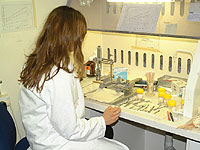|
||||||||||||||||||||||||||||||||||||||||||||
| Advanced Clinical Optometry - OPTM7301 | ||||||||||||||||||||||||||||||||||||||||||||

Description This course comprises clinical work on selected patients with special emphasis on advanced techniques and new developments. Optometric examination procedures include: gonioscopy, slit lamp fundoscopy, binocular indirect ophthalmoscopy and scleral depression; ultrasonography; corneal topography; ocular photography; computerised visual field analysis; visual functions; low vision; optometric co-management; evaluation of binocular functions; geriatric and paediatric optometry; the clinical application of electrophysiological techniques. Assessments of new instruments, methods and treatments.
The course is offered as an overseas posting at the LV Prasad Eye Institute in Hyderabad, India subject to the ability of the location to host the candidate in the time requested. This posting is for a 4-week period, with travel and accommodation costs to be met by the candidate. Note: Short course format - overseas posting. Candidates must have successfully completed the Ocular Therapy component to be eligible for the posting. Candidates who have not completed this course can lodge an application at the School Office. Each application will then be reviewed and assessed on merit. |
||||||||||||||||||||||||||||||||||||||||||||


